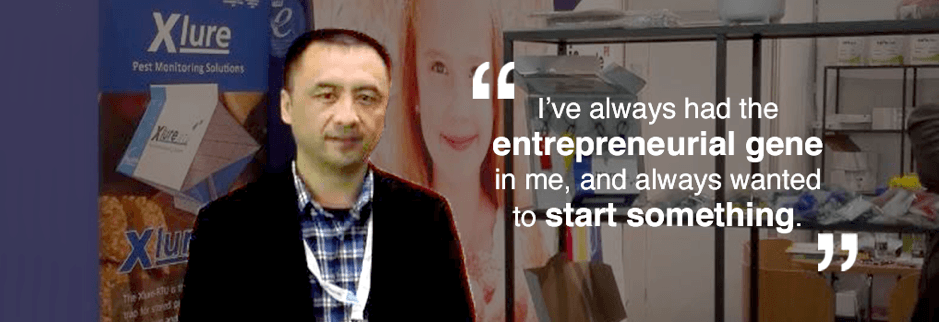Gaining Knowledge Across Different Facets Of The Business

For Guangwei, learning never stops. As a non-technical business founder in the ever-changing biotechnology industry, there is an overwhelming amount of information to absorb everyday. With the hands-on entrepreneurial education from MSc TIP, he was able to go beyond textbook structures and frameworks to determine the the best strategy to take his company forward with his trusted team.
What kickstarted your interest in entrepreneurship?
GW: Entrepreneurship is in my genes, and I always want to start something. During the dotcom boom, I started my own company and ran it for two years. I learnt everything on the job, and everything I did was based on my own personal experiences. I wasn’t as mature then, and of course things did not turn out as smoothly as I had hoped.
My interest in biotech was stirred when I started working at a raw materials processing factory, in an industry similar to the one I am in now. It was then that I discovered a passion I never knew I had; I really enjoyed myself and appreciated how the industry helped to improve others’ lives. My entrepreneurial instinct prompted me to take the leap into starting up my own company in the same space, Qingdao Russell IPM Bio-Tech.

What made you want to formally further your education in technopreneurship?
GW: Prior to my time at MSc TIP, I had taken up a Masters in Business Administration (MBA), in the hopes of better understanding entrepreneurial management. However, I felt that the course was more geared towards the grooming of a corporate professional, as it only imparted the necessary information to manage and lead in a large corporation. It may have helped me better understand the advantages of establishing structures and frameworks, but it sadly did not do enough to fuel the entrepreneurial fire within me.
After the MBA, I decided to look for a programme that is focused on grooming and equipping a business founder with more targeted entrepreneurial knowledge. MSc TIP turned out to be what I was looking for, with modules encompassing the different aspects – finance, marketing, business strategy and more. Of course, a course in entrepreneurship will not magically impart all the nuts and bolts of running a company. It’s even more impossible if you learn entrepreneurship just to catch the wave. But the course is able to guide you and unlock your entrepreneurial potential – the direction you choose to take from there on will be up to you.
Comparing between the two programmes, I feel that an MBA helps you greatly in establishing structures and learning from there, but MSc TIP pushes you to fill in the blanks, to try out new things and to go off the beaten path.
How has MSc TIP given you an edge over fellow peers?
GW: Prior to the course, I had no idea why my first startup failed – was it due to my lack of experience, or my lack of management skill? After MSc TIP, I could finally understand why I failed, and I was also able to better anticipate each stage and the potential stumbling blocks along the way. It taught me that the idea would merely be the starting point, while the process would be long one with many steps, resources, and market acceptances required. Armed with a better and more realistic perspective, I fared better this second time round. I’ve also been more focused and informed when making business decisions.
What are some of the challenges you face as an entrepreneur?
GW: Because I’m not from a pure technical background in biotech, there are many issues which I’m not able to make better informed decisions on my own. Though I oversee many facets of the business – technology, research and development, marketing, business strategy and development – I’m not able to form holistic judgments. Thankfully today I have a team of over 20 people who specialise in their own technical fields. Each month, I consult them before making tough decisions. This gives me a better perspective from not just my own strategic viewpoint, but also from their technical standpoints.
It helps improve my decision-making process – they provide me with their inputs, while I will process these inputs to make the final strategic decision. The team is very important in this respect.


Qingdao Russell IPM Bio-Tech is a biotech company which adopts advanced green tech and products in the fields of food storage, agriculture, forest and public health. The company distributes these products imported directly from their partner in the United Kingdom and promotes them in the China market. Qingdao Russell IPM Bio-Tech is certified across many industry benchmarks and quality assurance organisations.